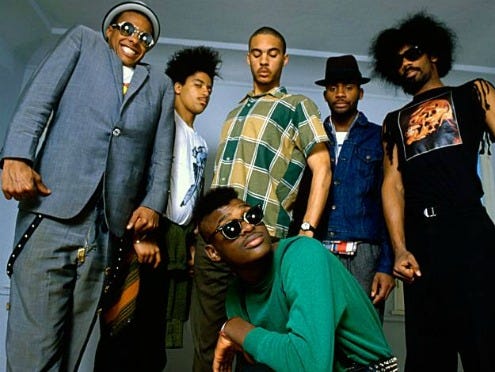Everyday Sunshine: The Story of Fishbone

For info and showtimes, click here.
"Everyday Sunshine: The Story of Fishbone" reminds me structurally of "Anvil! The Story of Anvil" about another once on-the-cusp band that never broke it big.
It uses archival footage to show the band during its heyday and talking-head interviews with famous musicians (Gwen Stefani, Flea of the Red Hot Chili Peppers) explaining how Fishbone had a huge influence on them. This is intercut with extemporaneous video as the surviving band mates attempt to forage on despite a lack of audiences or interest in the world in general.
Instead of heavy metal, this film centers on a band that had its own eclectic sound blending punk rock, ska, African rhythms, funk and big-band instruments like trombone and trumpet. The six members of Fishbone were all Los Angeles teens who had a desperate need to express themselves in a unique way.
Their stage act was the most notable thing about them. There was no discernible lead singer (at least at first), and they jumped around on the stage in a mix of exuberance and celebration that looked like chaos but actually had a highly choreographed feel. They were young black men playing in front of mosh pits full of white teens with a sound that, as one observer puts it, seemed to have descended from Mars.
Leaping back and forth from the 1980s and '90s to present day, directors Lev Anderson and Chris Metzler show how the band dissolved and dissipated, re-formed and carried on in its present form — that is to say with only singer/saxophonist Angelo Moore and bassist Norwood Fisher still in the band, when they're not sniping about the direction of their musical careers.
"Career" is an ambitious term to describe what is going on in present day. Moore has been kicked out of his apartment for failing to pay rent and has moved back in with his elderly mother, who scolds him like a schoolboy. Fisher has a beach apartment and enjoys surfing, and not much else that the film reveals.
We've seen this rise-and-fall trajectory in a hundred other docs about bands, so there really isn't much compelling here. Only the distinctiveness of their sound makes the story of Fishbone a little more interesting, since at least Anvil could be dismissed as just another heavy-metal group. Fishbone never worried about fitting into any neat holes, which was both a strength and the source of the band's demise.
As the members — Kendall Jones, Chris Dowd, "Dirty" Walt Kibby II and Norwood's brother Phillip formed the rest of the original core — grew older and inevitably evolved in different ways, they no longer meshed the way they did when they were freewheeling teenagers.
As their former big-name label representative says, if Fishbone had been less democratic in their internal politics and more so in their musical styles, they probably would've gone mainstream and still be together today.
Still, it's an anguishing thing to watch old footage of the band rocking out a huge club with thousands of people back in the day and cut to them playing in a gray, stone square somewhere in Hungary to a small collection of cheap plastic chairs, half of which are empty. It takes a special kind of dreamer, and a certain kind of masochist, to keep playing when few seem interested in listening.
Things get draggy in the movie's latter sections, such as an overlong exploration of Angelo's exploration of the Theremin instrument — waving his hands through its invisible electrical field and dubbing himself Dr. Madd Vibes, driving his friends batty.
At just under two hours, "Everyday Sunshine" is a bit long and sometimes seems more interested in the personalities quirks of the members of Fishbone than the creative impulses that drove them, at least initially. Angelo Moore, in particular, believes he is much more interesting to the world than the world seems to think.
3 Yaps



